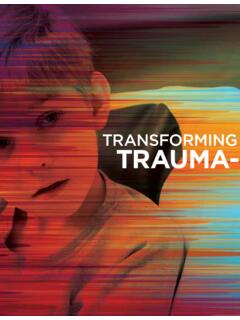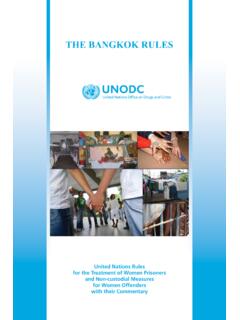Transcription of TRAUMA AND THE LAW: APPLYING TRAUMA-INFORMED …
1 TRAUMA AND THE LAW: APPLYING TRAUMA - informed PRACTICE TO LEGAL AND JUDICIAL CONTEXTS. ABSTRACT. The applicability of ` TRAUMA - informed practice' to the practice of law is increasingly recognised. While originating from within the field of mental health, mounting evidence supports the contention that `more effective, fair, intelligent, and just legal responses must work from a perspective which is TRAUMA - informed ' (Randall & Haskell, 2013). By contrast, implementation of TRAUMA informed principles to the contexts of law remains in its infancy. This paper introduces the core principles of TRAUMA - informed practice with reference to the many areas of legal practice to which they relate.
2 The evidence base for widespread application of TRAUMA - informed practice within and across the legal system and judiciary is presented, and the many benefits of implementation of TRAUMA informed principles to legal practice are discussed. Blue Knot Foundation 2016. Authors: Dr. Cathy Kezelman AM and Dr. Pam Stavropoulos Dr. Cathy Kezelman AM, President Blue Knot Foundation Dr. Pam Stavropoulos, Head of Research Blue Knot Foundation Blue Knot Foundation 2016 TRAUMA and the Law: APPLYING TRAUMA - informed Practice to Legal and Judicial Contexts Authors: Kezelman & Stavropoulos P.
3 Blue Knot Foundation Centre in the Park, Forsyth Park, Montpelier St., Neutral Bay 2028. T: (02) 8920 3611. Page 1 of 25. Blue Knot Foundation TRAUMA AND THE LAW: APPLYING TRAUMA - informed PRACTICE TO LEGAL AND JUDICIAL CONTEXTS. BACKGROUND PAPER. Most if not all, situations of conflict and harm involve questions of justice and injustice, and situations of injustice frequently involve TRAUMA . (Zehr, 2009). TRAUMA and interconnected. (Randall & Haskell, 2013:503). Originating from within the field of mental health - and now well established within that sector - the paradigm of ` TRAUMA - informed practice' is applicable not only to mental health, but to all forms of human service delivery and interaction.
4 Necessarily, this includes the domain of law - `As a powerful institution in society, law regularly encounters and deals with people, both as victims and offenders, whose lives have been shaped and harmed by traumatic events'.1. 1. Melanie Randall & Lori Haskell, ` TRAUMA - informed Approaches to Law: Why Restorative Justice Must Understand TRAUMA and Psychological Coping', The Dalhousie Law Journal (Fall 2013), Page 2 of 25. Blue Knot Foundation The recommendation that both the legal and justice systems (and the criminal justice system in particular) should be TRAUMA - informed is recent.
5 Yet mounting evidence supports the contention that `more effective, fair, intelligent, and just legal responses must work from a perspective which is TRAUMA informed '.2 As in the mental health sector, broad-based implementation of this approach would benefit not only clients and practitioners, but whole systems and organisations. By presenting key themes of the relevant research base, this background paper makes the case for legal and judicial practice to become ` TRAUMA - informed '. It defines the core principles of TRAUMA informed practice, the multiple benefits of their implementation, and some of the many areas and aspects of law to which TRAUMA - informed practice is pertinent.
6 Although the challenge of the paradigm shift, within and across the legal and justice systems, both in scope and nature is substantial, this paper illustrates multiple grounds for the introduction and embedding of TRAUMA - informed practice. While the nature and brevity of the paper preclude a comprehensive account of these, a large and growing evidence base substantiates the case for TRAUMA - informed practice per se. The pivotal role of law in the regulation of human behaviour and the adjudication of disputes further suggests why the domain of law cannot remain immune to its implementation.
7 Defining TRAUMA and TRAUMA - informed practice TRAUMA stems from the overwhelming of coping mechanisms in response to perception or experience of extreme threat. Unlike `normal life stress' (which is constant and experienced by everybody) the perception of extreme threat activates innate `fight', `flight' and/or `freeze' responses which are protective at the time of the precipitating event/s but which corrode health over time if the underlying TRAUMA is not resolved. For those who live with the effects of unresolved TRAUMA , `normal life stress' can be profoundly destabilising, trapping them in a cycle of physical and psychological reactivity which is devastating to well- being and to a wide spectrum of functioning.
8 2. ibid: 501. Page 3 of 25. Blue Knot Foundation TRAUMA stems from extreme stress but is highly prevalent. For most people, the word ` TRAUMA ' connotes single incidents and events ( post-traumatic stress disorder; PTSD). But `there is more to TRAUMA than PTSD'.3 It is important to distinguish between `single incident' TRAUMA (PTSD) and what is increasingly called `complex' TRAUMA ( cumulative, underlying, and often interpersonally generated). In fact, `complex' interpersonally generated TRAUMA is not only more extensive in its impacts across a range of functioning,4. but is also more This includes within legal and judicial contexts.
9 Increasingly within the health sector a range of otherwise diverse problems, conditions and disorders are being recognised as Yet vast numbers of people who experience the effects of complex interpersonally-generated TRAUMA also access human services both within and outside the health sector. Often their TRAUMA relates to childhood experiences at the hands of care-givers. Unresolved early life TRAUMA is correlated unequivocally not only with a raft of adverse physical and psychological health problems in adulthood,7 but with a range of psychosocial issues as well. Because complex TRAUMA -related problems present in many guises (including risky and/or challenging behaviours) service-providers may not readily identify the TRAUMA operative in the lives of their clients.
10 Similarly, the unresolved TRAUMA in the lives of many people who engage in various capacities with the legal system is not necessarily apparent to practitioners of law. 3. Robin Shapiro, The TRAUMA Treatment Handbook (New York: Norton, 2010), 4. `It is clear from many studies that interpersonal violence is more likely to have long-term consequences than natural disasters or accidents' (Sandra Bloom & Brian Farragher, Destroying Sanctuary, Oxford University Press, New York, 2011), For elaboration of the debilitating effects of complex TRAUMA , and the multiple health impacts for which treatment is necessary, see Christine A.






